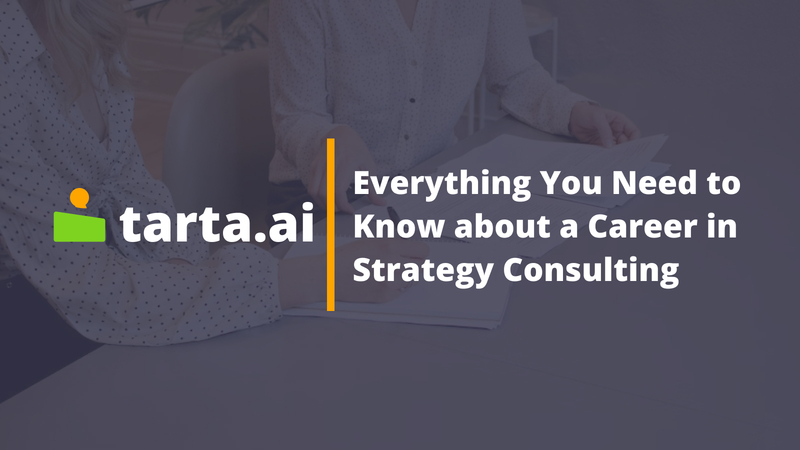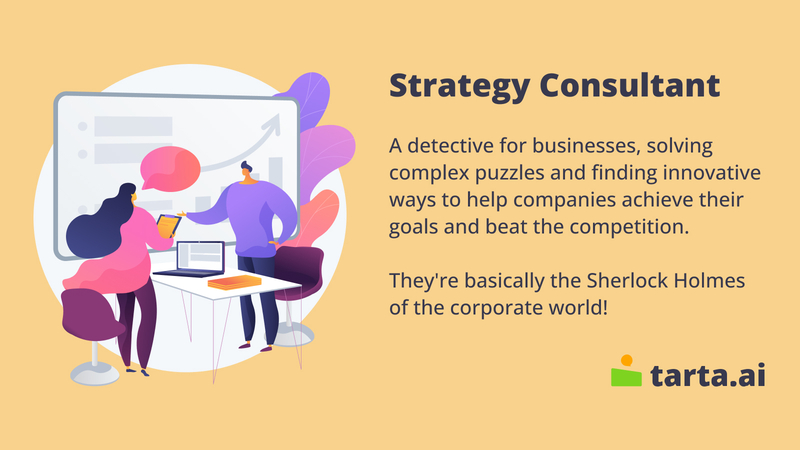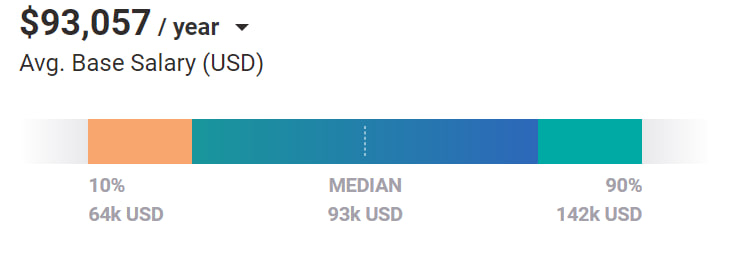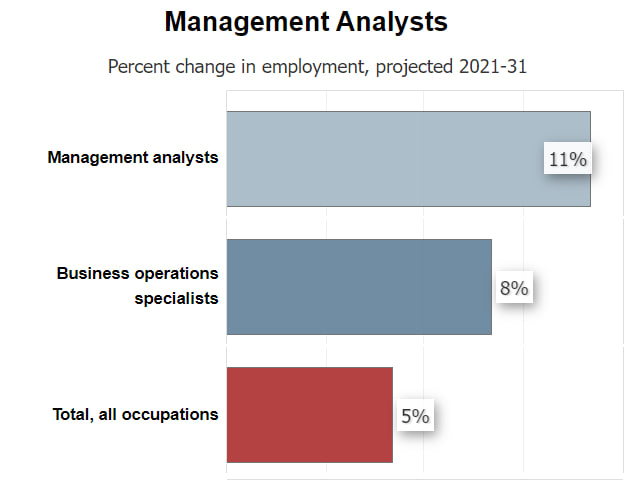Everything You Need to Know about a Career in Strategy Consulting

Strategy consultants play a critical role in helping organizations achieve their strategic goals and overcome business challenges. They possess a range of analytical, communication, and strategic thinking skills, and work closely with clients to develop effective strategies and recommendations.
In this article, we explore various aspects of the strategy consulting profession, including career possibilities, work environment settings, tools and technologies, education and experience requirements, and the pros and cons of the job. We also discuss the current demand for strategy consultants in the US and the flexible and remote work options available to them. By providing valuable insights and information, this article aims to help current and future strategy consultants navigate the job market and make informed decisions about their career paths.
Position Overview
A strategy consultant is a professional who provides advice and assistance to organizations on how to achieve their strategic objectives. They work with businesses, governments, and other organizations to help them make informed decisions about their future direction and to develop plans to achieve their goals.

Strategy consultants are typically hired by organizations that are facing significant challenges or changes, such as rapid growth, industry disruption, or shifting market dynamics. They may also be brought in to help organizations identify and capitalize on new opportunities, or to help them navigate complex regulatory environments.
Strategy consultants typically have backgrounds in business, management, or other relevant fields, and they may have experience in areas such as market research, financial analysis, and strategic planning. They often work for consulting firms, but some may also work independently or within an organization's internal consulting function.
Key Qualifications
The key qualifications for a strategy consultant include:
- Education and Experience: A bachelor's or master's degree in business, management, economics, or a related field is typically required for this role. Candidates with an MBA or other advanced degree in a relevant field are highly preferred. Relevant work experience in consulting, finance, or a related field is also desirable.
- Analytical Skills: Analyzing complex business problems and identifying relevant data to inform decision-making. Having strong quantitative skills, being proficient in data analysis, and being able to use data to inform their recommendations.
- Communication Skills: Having excellent communication skills, both written and verbal. Strategy consultants should be able to communicate complex ideas clearly and concisely to clients and stakeholders at all levels of an organization.
- Strategic Thinking: Thinking strategically and understanding how to develop and implement effective business strategies. Being able to anticipate market trends and identify opportunities for growth.
- Project Management Skills: Managing complex projects and multiple stakeholders, often under tight deadlines. Strategy consultants should be skilled at managing resources, delegating tasks, and monitoring progress.
- Adaptability: Being adaptable and able to work in fast-paced, dynamic environments. Strategy consultants should be able to quickly learn new concepts and industries, and be comfortable working with ambiguity and uncertainty.
- Client Management: Building strong relationships with clients and stakeholders, and understanding their needs and expectations. Strategy consultants should be able to manage client expectations, negotiate effectively, and provide exceptional customer service.
Interesting fact:
The top consulting firms, such as McKinsey, Bain, and BCG, are some of the most desirable employers in the world, and they receive hundreds of thousands of applications each year.
Tasks and Expectations
The tasks and expectations of a strategy consultant can vary depending on the organization they work for and the specific project they are working on. However, some common tasks and expectations of a strategy consultant include:
- Conducting research: Strategy consultants must be able to conduct research to gather information about the market, competitors, and other relevant factors that can impact a company's success.
- Analyzing data: Strategy consultants must be able to analyze data to identify trends, patterns, and insights that can inform their recommendations.
- Developing strategies: Strategy consultants must be able to develop and recommend strategies that will help their clients achieve their goals.
- Providing advice: Strategy consultants must be able to provide advice to their clients on a wide range of business issues, including market trends, regulatory changes, and industry disruptions.
- Creating presentations: Strategy consultants must be able to create clear, concise, and visually appealing presentations that effectively communicate their findings and recommendations.
- Managing projects: Strategy consultants must be able to manage projects from start to finish, including developing project plans, managing timelines, and coordinating with team members and stakeholders.
- Building relationships: Strategy consultants must be able to build strong relationships with clients and stakeholders, and demonstrate exceptional customer service and communication skills.
The expectations for a strategy consultant are to provide insightful recommendations to clients that will help them achieve their business goals and overcome challenges they face. They should be able to bring a unique perspective and expertise to each project they work on, and be able to adapt to the needs of their clients and the ever-changing business landscape.
Compensation
The salary of a Strategy Consultant in the US can vary depending on factors such as location, years of experience, and the company they work for. However, according to PayScale, the average base salary for a Strategy Consultant in the US is around $93,000 per year.

Source: PayScale
Here is an overview of the average Strategy Consultant salary by states in the US:
State | Salary | State | Salary |
California | $119,000 | New York | $116,000 |
Texas | $96,000 | Illinois | $93,000 |
Massachusetts | $110,000 | Georgia | $87,000 |
Florida | $86,000 | Virginia | $94,000 |
Pennsylvania | $92,000 | Ohio | $89,000 |
Michigan | $85,000 | North Carolina | $89,000 |
Washington | $106,000 | Colorado | $96,000 |
Maryland | $95,000 | New Jersey | $107,000 |
Arizona | $82,000 | Tennessee | $85,000 |
Minnesota | $90,000 | Indiana | $86,000 |
Note that these are averages and that actual salaries can vary depending on factors such as the consultant's experience, education, industry, and the specific company they work for. Additionally, cost of living can vary significantly across different states, so a higher salary in one state may not necessarily mean a higher standard of living compared to a lower salary in another state.
Strategies for Increasing Income
Here are some strategies for increasing income for a Strategy Consultant:
- Develop a specialization: Developing expertise in a particular industry or functional area can help you stand out from other consultants and command higher fees. Consider investing time in building a reputation as a thought leader in a specific area, such as healthcare or supply chain management.
- Expand your network: Building a strong network of professional contacts can help you attract new clients and increase your visibility in the industry. Attend industry events, join professional associations, and use social media to connect with others in your field.
- Market yourself effectively: Develop a strong personal brand and create marketing materials that highlight your expertise and experience. Create a professional website, use social media to promote your services, and develop a strong pitch to attract new clients.
- Offer additional services: Consider expanding your services beyond traditional consulting to include training, coaching, or other value-added services. These can allow you to command higher fees and attract a wider range of clients.
- Negotiate for higher rates: Be confident in the value you bring to your clients and don't be afraid to negotiate for higher rates. Consider offering tiered pricing or package deals to make your services more attractive to clients while still increasing your overall income.
- Consider working for a top consulting firm: Top consulting firms often offer higher salaries and bonuses than smaller firms, as well as greater opportunities for advancement and professional development. Consider pursuing a job at a top consulting firm to increase your earning potential.
Interesting fact:
Many successful CEOs, politicians, and other prominent figures have started their careers in strategy consulting, including Mitt Romney, Jeff Immelt, and Sheryl Sandberg.
Supplementary Perks
In addition to salary, Strategy Consultants may receive various additional benefits depending on the company they work for. Here are some examples:
- Bonuses: Many consulting firms offer performance-based bonuses that can significantly increase a consultant's total compensation.
- Profit-sharing: Some companies offer profit-sharing plans, which allow employees to receive a share of the company's profits in addition to their salary and bonuses.
- Health insurance: Most consulting firms offer health insurance benefits to their employees, including medical, dental, and vision coverage.
- Retirement plans: Many firms offer retirement plans, such as 401(k) plans or pension plans, to help employees save for their future.
- Paid time off: Strategy Consultants often receive paid vacation days, sick days, and holidays.
- Travel perks: Consultants who frequently travel for work may receive benefits such as airline miles, hotel loyalty points, and travel expense reimbursement.
- Professional development: Consulting firms may offer training and development programs, as well as opportunities to attend industry events and conferences, to help employees enhance their skills and knowledge.
- Employee discounts: Some companies offer employee discounts on products or services, such as gym memberships or company products.
- Flexible work arrangements: Many consulting firms offer flexible work arrangements, such as remote work options or flexible schedules, to help employees maintain work-life balance.
- Relocation assistance: For consultants who need to relocate for their job, companies may offer relocation assistance to help with the costs of moving, such as housing or transportation expenses.
Work Environment
As a strategy consultant, your work environment and the tools and technologies you use are critical to your productivity and success. In this section, we will explore the key settings that can help you optimize your workspace and the various tools and technologies that can help you analyze data, develop strategies, and communicate your findings. By setting up a work environment that meets your needs and using the right tools and technologies, you will be better equipped to focus, stay productive, collaborate effectively with team members, and deliver high-quality work as a strategy consultant.

Photo: Gabrielle Henderson/Unsplash
Work Environment Settings
As a strategy consultant, your work environment is critical to your productivity and success. Here are some key settings that can help you optimize your workspace:
Setting | Description |
Quiet space | As a strategy consultant, you will need to analyze complex information and data. A quiet space without interruptions will allow you to focus on your work. |
Large screen | You will be working with large amounts of data, reports, and presentations. A large screen or multiple monitors will help you keep all the information in view and easily accessible. |
Comfortable seating | You will likely spend long hours working at your desk. A comfortable, ergonomic chair will reduce the risk of discomfort or pain from sitting for extended periods. |
Adequate lighting | Good lighting is essential for your work. Natural light is ideal, but if that's not possible, invest in good-quality artificial lighting that is easy on the eyes and bright enough to read small text. |
High-speed internet | As a strategy consultant, you will need to access and transfer large amounts of data. A fast and reliable internet connection is essential to keep you productive. |
Organized workspace | An organized workspace will help you stay on top of your work and reduce stress. Use filing systems, folders, and other organizational tools to keep your workspace tidy and efficient. |
Collaboration tools | As a consultant, you will often work with others on projects. Collaboration tools like video conferencing, instant messaging, and project management software will help you stay connected and productive. |
Mobile technology | As a strategy consultant, you may need to work remotely or on-the-go. Make sure you have a reliable laptop or tablet with the necessary software and connectivity to work from anywhere. |
By setting up a work environment that meets these needs, you will be better able to focus, stay productive, and deliver high-quality work as a strategy consultant.
Interesting fact:
The role of strategy consultants has evolved over time, with an increased emphasis on digital transformation, data analytics, and sustainability.
Tools and Technologies
Strategy consultants use a variety of tools and technologies to help them analyze data, develop strategies, and communicate their findings. Here are some of the most common tools and technologies used by strategy consultants:
- Data Analytics Tools: Strategy consultants use data analytics tools to analyze large sets of data and identify trends and patterns that can inform their recommendations. Examples of these tools include Microsoft Excel, Tableau, and Power BI.
- Project Management Software: Consultants often work on complex projects with multiple stakeholders. Project management software, such as Asana or Trello, helps consultants stay organized, track progress, and collaborate effectively.
- Cloud-based Document Management: Consultants work with a lot of documents and files that need to be easily accessible and shareable. Cloud-based document management tools, like Google Drive or Dropbox, allow consultants to store and share documents with clients and team members.
- Communication and Collaboration Tools: As consultants often work remotely or with teams spread across different locations, communication and collaboration tools are critical to keep everyone aligned. Examples include Zoom, Slack, and Microsoft Teams.
- Presentation Software: Consultants need to create compelling presentations to communicate their recommendations to clients. Microsoft PowerPoint, Prezi, and Google Slides are common tools for creating professional-looking presentations.
- Competitive Intelligence Tools: Strategy consultants use competitive intelligence tools to gather information about competitors and industry trends. Examples of these tools include LexisNexis, Hoover's, and SimilarWeb.
- Strategy Mapping and Design Tools: Consultants use strategy mapping and design tools, such as Lucidchart or Miro, to visually represent complex data and help stakeholders better understand their findings.
By utilizing these tools and technologies, strategy consultants can efficiently analyze data, develop strategies, collaborate with team members, and communicate recommendations to clients.

Photo: Campaign Creators/Unsplash
Education and Training
To become a strategy consultant, there are a few key areas of education and training that can be helpful:
- Education in business or a related field: Many strategy consultants have a background in business, finance, economics, or a related field. A bachelor's degree in one of these areas can be a good foundation for a career in strategy consulting. Some strategy consultants may also have a master's degree in business administration (MBA).
- Relevant work experience: While not always required, having relevant work experience can be helpful for becoming a strategy consultant. This could include working in a related field such as finance, management consulting, or a specific industry.
- Analytical and problem-solving skills: Strong analytical and problem-solving skills are critical for a strategy consultant. These skills can be developed through coursework in statistics, data analysis, and critical thinking.
- Communication and interpersonal skills: Strategy consultants must be able to communicate effectively with clients and team members, and work collaboratively to solve complex problems. Courses in communication, public speaking, and team management can be helpful for developing these skills.
- Industry-specific knowledge: Depending on the industry or industries that a strategy consultant works in, specialized knowledge of that industry may be required. This could include knowledge of industry trends, regulations, and competitive landscape.
Interesting fact:
The roots of strategy consulting can be traced back to the early 1900s, when firms like McKinsey & Company began offering management consulting services to help businesses improve their operations.
Advancement Opportunities
If you're interested in a career as a strategy consultant, there are many paths you can take. In this section, we'll explore the steps you can take to develop a career as a strategy consultant, including education and experience requirements, as well as tips for building your network and developing your skills. We'll also look at the different specializations within the field of strategy consulting, from corporate strategy to marketing strategy, and discuss the unique skills and expertise required for each. We'll explore some other career possibilities for individuals interested in helping companies improve their performance and competitiveness, including management consulting, business development, product management, marketing, finance, and entrepreneurship. Whether you're just starting out or looking to take your career to the next level, this section will provide valuable insights and practical advice for developing a successful career in strategy consulting and related fields.

Photo: Scott Graham/Unsplash
Steps to Develop a Strategy Consultant Career
Developing a career as a strategy consultant requires a combination of education, skills, and experience. Here are some steps that can help you build a successful career in this field:
- Develop your analytical skills: Strategy consultants must be able to analyze data, identify trends, and develop insights. You can develop your analytical skills by taking courses in statistics, data analysis, and research methods.
- Hone your communication skills: Strategy consultants must be able to communicate complex ideas to clients, team members, and stakeholders. You can improve your communication skills by practicing public speaking, writing reports, and presenting your ideas to others.
- Build your network: Networking is critical for developing a successful career in strategy consulting. Attend industry events, join professional organizations, and connect with colleagues on social media to build relationships and learn about new opportunities.
- Consider certification: Some organizations offer certification programs for strategy consultants, which can demonstrate your expertise and commitment to the field. Examples include the Certified Management Consultant (CMC) designation and the Chartered Financial Analyst (CFA) credential.
- Seek out mentorship: A mentor can provide valuable guidance and support as you develop your career in strategy consulting. Look for experienced consultants who are willing to share their knowledge and insights with you.
- Keep learning: Strategy consulting is a constantly evolving field, and staying up-to-date on industry trends and best practices is essential. Attend conferences, read industry publications, and take continuing education courses to stay ahead of the curve.
By following these steps, you can develop a successful career as a strategy consultant and make a positive impact on organizations across a variety of industries.
Interesting fact:
The consulting industry is estimated to be worth over $250 billion worldwide, and strategy consulting is one of the largest segments of the industry.
Specializations in Strategy Consultant Job
Strategy consultants typically work with companies to help them develop and implement strategies that improve their performance and competitive position. While strategy consulting is a broad field, there are several specializations that consultants may choose to focus on:
Specialization | Description |
Corporate strategy | This involves helping companies define their overall mission and objectives, and identifying the best ways to achieve them. Corporate strategy consultants may work with companies to assess their existing operations, identify areas for improvement, and develop plans for growth. |
Operations strategy | This involves optimizing a company's internal processes and operations to improve efficiency, reduce costs, and increase productivity. Operations strategy consultants may help companies redesign their supply chains, streamline manufacturing processes, or develop new distribution strategies. |
Financial strategy | This involves helping companies manage their finances and allocate resources effectively. Financial strategy consultants may help companies develop financial models, assess investment opportunities, or identify ways to reduce costs. |
Marketing strategy | This involves helping companies develop effective marketing and branding strategies to attract and retain customers. Marketing strategy consultants may help companies develop advertising campaigns, conduct market research, or identify new market opportunities. |
Technology strategy | This involves helping companies leverage technology to improve their operations and gain a competitive advantage. Technology strategy consultants may help companies develop digital transformation strategies, assess the potential impact of emerging technologies, or implement new IT systems. |
Innovation strategy | This involves helping companies identify and develop new products and services that meet customer needs and create new revenue streams. Innovation strategy consultants may help companies conduct market research, identify emerging trends, or develop new product concepts. |
Mergers and acquisitions (M&A) strategy | This involves helping companies evaluate potential acquisitions or mergers, and develop strategies for integrating new businesses. M&A strategy consultants may help companies assess the financial and operational risks of a potential acquisition, negotiate deals, or develop integration plans. |
Specializing in one or more of these areas can help consultants develop a deep expertise in a particular area, which can be valuable for both their clients and their career development.

Photo: Austin Distel/Unsplash
Other Career Possibilities
In addition to strategy consulting, there are several other career possibilities for individuals interested in helping companies improve their performance and competitiveness. Here are a few examples:
- Management Consulting: This involves providing advice and guidance to companies on a wide range of business issues, including strategy, operations, finance, marketing, and human resources. Management consultants work with companies of all sizes and across a variety of industries, and may specialize in a particular area of expertise.
- Business Development: This involves identifying and pursuing new business opportunities for companies, such as partnerships, joint ventures, and strategic alliances. Business development professionals may also be responsible for negotiating deals, developing relationships with key stakeholders, and building market share.
- Corporate Development: This involves managing a company's mergers and acquisitions (M&A) activities, including identifying potential acquisition targets, negotiating deals, and integrating new businesses. Corporate development professionals may also be responsible for developing the company's overall growth strategy.
- Product Management: This involves managing the development, launch, and ongoing support of a company's products and services. Product managers work closely with cross-functional teams, including engineering, design, marketing, and sales, to ensure that products meet customer needs and achieve business goals.
- Marketing: This involves developing and executing marketing strategies to promote a company's products and services. Marketing professionals may be responsible for market research, advertising, public relations, social media, and other promotional activities.
- Finance: This involves managing a company's financial resources, including budgeting, forecasting, financial analysis, and investment decisions. Finance professionals may also be responsible for managing the company's cash flow, financial reporting, and risk management.
- Entrepreneurship: This involves starting and running a new business, either as an independent entrepreneur or within an existing company. Entrepreneurs must be able to identify market opportunities, develop innovative products or services, and build a sustainable business model.
These are just a few examples of the many career possibilities for individuals interested in helping companies improve their performance and competitiveness. Each of these fields requires a unique set of skills and expertise, and offers a variety of opportunities for career growth and development.
Employment Trends
In this section, we will explore the current demand for Strategy Consultants in the US, as well as the flexible and remote work options available to them. Understanding these trends can help both current and future Strategy Consultants navigate the job market and make informed decisions about their career paths.
Interesting fact:
One of the key tools that strategy consultants use is the "case interview," in which candidates are given a business problem to solve and must use their analytical and strategic thinking skills to come up with a solution.
Strategy Consultant Demand
The U.S. Bureau of Labor Statistics (BLS) categorizes Strategy Consultant jobs under the broader category of Management Analysts. According to the BLS, as of May 2021, there were approximately 950,600 Management Analyst jobs in the United States.
However, it is important to note that the demand for Strategy Consultants may vary depending on the industry and region they work in. For example, the demand for Strategy Consultants may be higher in industries such as healthcare, technology, and finance. Additionally, major metropolitan areas may have a higher demand for Strategy Consultants than rural areas.
Overall, the demand for Strategy Consultants is expected to grow over the next decade, as companies seek to improve their performance and competitiveness. The BLS projects a 11% increase in employment for Management Analysts from 2021 to 2031, which is much faster than the average growth rate for all occupations.

Source: U.S. Bureau of Labor Statistics, Employment Projections program
Flexible and Remote Work Arrangements
Strategy Consulting firms have been moving towards offering flexible and remote work options, especially since the onset of the COVID-19 pandemic. Some of the flexible and remote work options available for Strategy Consultants include:
- Flextime: Strategy Consulting firms may offer flextime, which allows employees to have more control over their schedules. This may involve being able to work earlier or later in the day, or working fewer hours on certain days to accommodate personal commitments.
- Remote Work: Many Strategy Consulting firms have embraced remote work, which allows employees to work from home or any location with an internet connection. Remote work options can vary from partial remote work (working from home a few days a week) to full remote work (working from home all the time).
- Project-Based Work: Some Strategy Consulting firms offer project-based work, which allows employees to work on a specific project for a set period of time. This may allow for more flexibility in terms of work hours and location.
- Job-Sharing: Job-sharing is a flexible work option where two employees share one full-time job. This can be an ideal option for those looking for part-time work or more flexibility in their work schedule.
The availability of these flexible and remote work options may vary from firm to firm, and may depend on the specific project and client needs. Additionally, some roles within Strategy Consulting may require more face-to-face interaction with clients and team members, making it less feasible to work remotely.
Interesting fact:
Many of the top strategy consulting firms have a strong focus on diversity and inclusion, and have implemented initiatives to increase representation of women, people of color, and other underrepresented groups in the industry.
Job Fulfillment
In this section, we will explore the pros and cons of a Strategy Consultant job. While there are many benefits to this type of job, such as a high salary and diverse experience, there are also several challenges, including long working hours and high pressure. We will examine both the advantages and disadvantages of a Strategy Consultant job to provide a comprehensive understanding of what it entails.
Pros | Cons |
Diverse experience Strategy consultants work on a range of projects for various clients, which means they gain exposure to different industries and business models. This can lead to a diverse and rewarding experience. | Long working hours Strategy consultants often work long hours, including weekends, to meet tight deadlines and deliver high-quality work. This can lead to a poor work-life balance and burnout.
|
High compensation Strategy consulting is a well-paid profession, and consultants typically earn a high salary and have access to various bonuses and benefits. | High pressure Strategy consultants work on high-stakes projects with tight deadlines, which can be stressful and demanding. This pressure can lead to a high level of job-related stress. |
Intellectual challenge Strategy consulting is a mentally demanding job that requires critical thinking, problem-solving, and analytical skills. This can provide a sense of intellectual challenge and stimulation. | Limited creativity Strategy consulting is focused on solving problems using established methodologies and frameworks. This can limit the opportunity for consultants to exercise creativity in their work. |
Networking opportunities Strategy consultants often work with senior executives and decision-makers, which provides an opportunity to build a valuable network of contacts that can be leveraged in the future. | Limited ownership Strategy consultants typically work on short-term projects and are not responsible for implementing their recommendations. This can lead to a lack of ownership and a feeling of detachment from the projects they work on. |

Photo: Jason Goodman/Unsplash
Strategy consulting is a challenging and rewarding profession that requires a unique set of skills and expertise. Strategy consultants work with clients to develop effective strategies and recommendations to help organizations achieve their strategic objectives. They use a range of tools and technologies to analyze data, collaborate with team members, and communicate recommendations to clients.
A career in strategy consulting offers many benefits, such as high compensation, diverse experience, and networking opportunities. However, it also comes with several challenges, such as long working hours, high pressure, limited creativity, and limited ownership. As the world of work continues to evolve, strategy consulting is experiencing a shift in demand and work options due to advances in technology and changes in work culture. Overall, strategy consulting is a dynamic and exciting profession that offers many opportunities for growth and professional development.
- Strategy consultants play a critical role in helping organizations achieve their strategic objectives and overcome business challenges.
- Strategy consultants possess a range of analytical, communication, and strategic thinking skills, and work closely with clients to develop effective strategies and recommendations.
- To become a strategy consultant, one can consider obtaining a bachelor's degree in business, finance, economics, or a related field, along with relevant work experience.
- The tools and technologies used by strategy consultants include data analytics tools, project management software, cloud-based document management, communication and collaboration tools, competitive intelligence tools, strategy mapping and design tools, and presentation software.
- A career in strategy consulting offers many benefits, such as high compensation, diverse experience, and networking opportunities. However, it also comes with several challenges, such as long working hours, high pressure, limited creativity, and limited ownership.
- The world of work is evolving, and strategy consulting is experiencing a shift in demand and work options due to advances in technology and changes in work culture.
- Strategy consulting is a dynamic and exciting profession that offers many opportunities for growth and professional development.
FAQ
What is strategy consulting?
Strategy consulting is a type of consulting service that helps organizations improve their overall performance by analyzing their current situation, identifying their goals and objectives, and developing a plan of action to achieve those goals.
What kind of clients do strategy consultants work with?
Strategy consultants work with a wide range of clients, including large corporations, small businesses, non-profit organizations, and government agencies.
What are some common challenges that strategy consultants help clients with?
Strategy consultants help clients with a variety of challenges, such as improving profitability, entering new markets, developing new products or services, and restructuring the organization.
What are some top strategy consulting firms?
Some of the top strategy consulting firms include McKinsey & Company, Boston Consulting Group, Bain & Company, Deloitte Consulting, and Accenture Strategy.